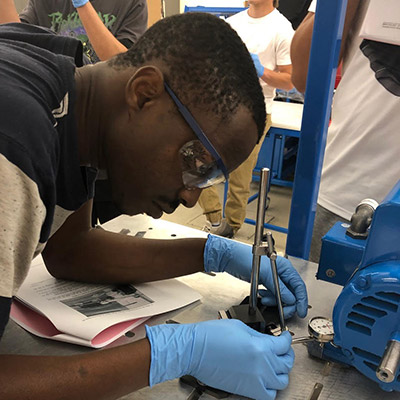
Empowering Equity
Overview
Dr. Ibram X. Kendi, the internationally renowned scholar of anti-racism, says that organizations have three options when confronting racism:
- Maintain the status quo
- Make gradual improvements
- Make systemic change now
Pima is choosing Option 3: make systemic changes now. We must be focused on taking action, because the COVID pandemic and the Black Lives Matter movement have accelerated the need to address inequality in America.
The past six months have brought into sharp relief the digital divide between whites and Communities of Color, and the fact that Communities of Color disproportionately work at lower-paying jobs, have worse health outcomes, and lack generational wealth.
Additionally, the economic crisis that is a consequence of the COVID health crisis has forced education to accept disruptive innovation with no warning.
What is equity at Pima? Some starting points
Equality is not equity. As former President Lyndon B. Johnson said at Howard University in 1965:
“Imagine a hundred-yard dash in which one of the two runners has his legs shackled together. He has progressed ten yards, while the unshackled runner has gone fifty yards. At that point the judges decide that the race is unfair. How do they rectify the situation? Do they merely remove the shackles and allow the race to proceed? Then they could say that ‘equal opportunity’ now prevailed. But one of the runners would still be forty yards ahead of the other. Would it not be the better part of justice to allow the previously shackled runner to make up the forty-yard gap, or to start the race all over again?”
Pima recognizes that as a community college, it is uniquely positioned to address issues of equity and social justice. Like many community colleges, Pima is a majority-minority school whose students are likely to be first-generation and of extremely modest means.
We have a responsibility to provide the knowledge, skills and mentorship to students so they can have a positive, meaningful impact on our community.
By doing what we do best – imparting knowledge and opening our students’ eyes to a world of possibility -- we can help create a society that is more just, one in which everyone has the opportunity to achieve their dream. In this sense, success for all students equals equity. That is why my 2020-21 goals include making progress in outcomes for all students, regardless of race, ethnicity, gender and economic status.
Additionally, we understand that higher education must conduct a close self-examination in order to address systemic inequities in the academy. We must put our own house in order before addressing larger, societal inequities.
Our initiatives
- Governing Board’s stated support of anti-racism
- Unconference in August featuring Dr. Kendi and educator Dr. Laura Rendón
- Shared reading of “How to Be an Antiracist”
- Black Forum drew more than 60 participants. The group is planning next steps based on survey results.
- The new Faculty Senate Systemic Justice Action Committee has met twice. The Committee’s tentative, draft charge: “Cultivate a liberatory institution by examining current practices and policies related to curriculum, academics, and governance; identifying ways to foster more equity-focused practices; working to shift policies and practices to support and promote equity, diversity, and inclusion; and facilitating social justice best practices at the College.”
- Breaking Student Barriers committee being formed.
- Provost’s Office and Teaching & Learning Center to facilitate additional dialogue to help create a common definition of “social justice” at Pima
- Strategic Planning Committee to help create a common definition of “social justice” at Pima
- Addition of two African-American history courses to Ethnic, Gender and Transborder Studies/Sociology curriculum
- National Institutes of Health grant to increase minority participation in STEM.
- Forum for Asian/Pacific Islanders and Desi Americans (APIDA) scheduled for Oct. 8
- Forums for LatinX and Indigenous Americans being developed.
Equity and technology
Technological advances are remaking our world. The College embraces the potential of these advances to improve the way we teach and support our students.
But action must be taken so that Communities of Color aren’t left behind in a period of societal and technological innovation. Moreover, we must be cognizant of the factors driving innovation. Paraphrasing Dr. Kendi, an inequitable system will deploy technological advances to perpetuate inequity.
Thus, the College will carefully scrutinize new technologies in a social justice context.
Equity and freedom of expression
Pima can boast of having employees and students from every walk of life and varying perspectives. That diversity adds value to the College and makes us stronger. The civil exchange of heartfelt views about ways to help our students achieve their goals will always be welcome, and is central to our College and to our democracy.
 Touré’s story
Touré’s story
- Participated in the first cohort of our Automated Industrial Technology (AIT) IBEST program, which ended December 2019.
- Secured an internship with Roche Tissue Diagnostics, completed in Summer 2020.
- Hired for a one-year contract to work to test instruments that diagnose cancer.
- Working with the electrical and pneumatic systems he studied in the AIT program.
- Will be making $18 an hour, 8 months after completing his Level 1 AIT Certificate.
- Continuing his education at Pima, working toward an Associate's in Engineering.

Previous Section: Bridging Gaps
Next section: Revitalizing Communities